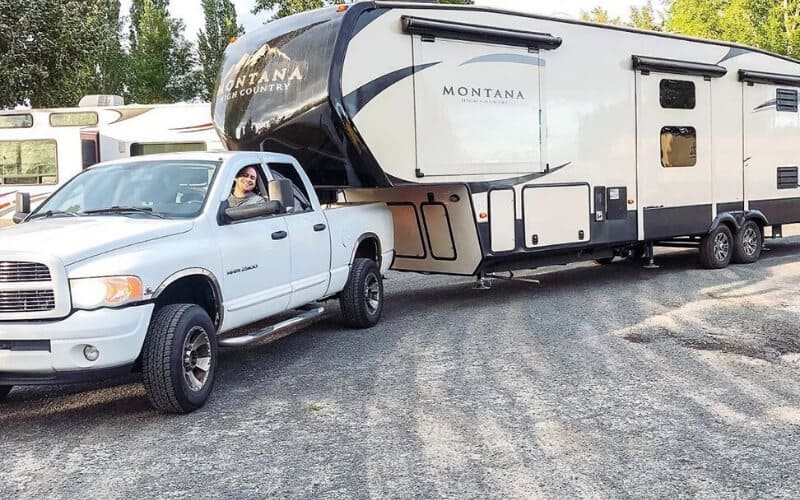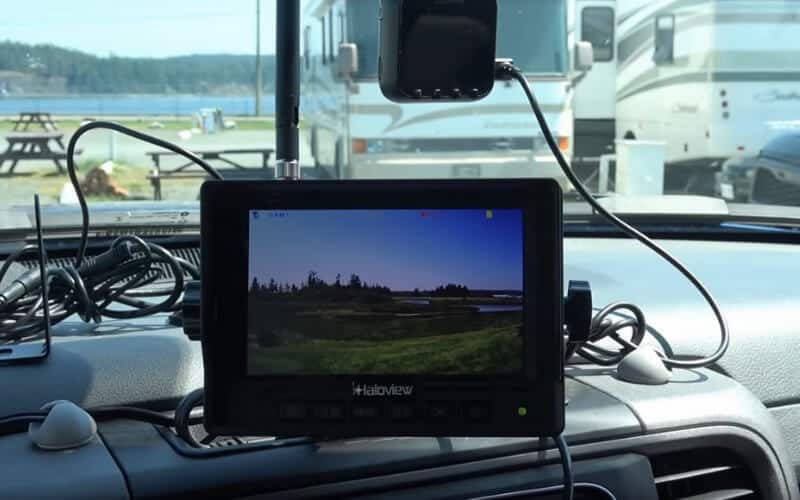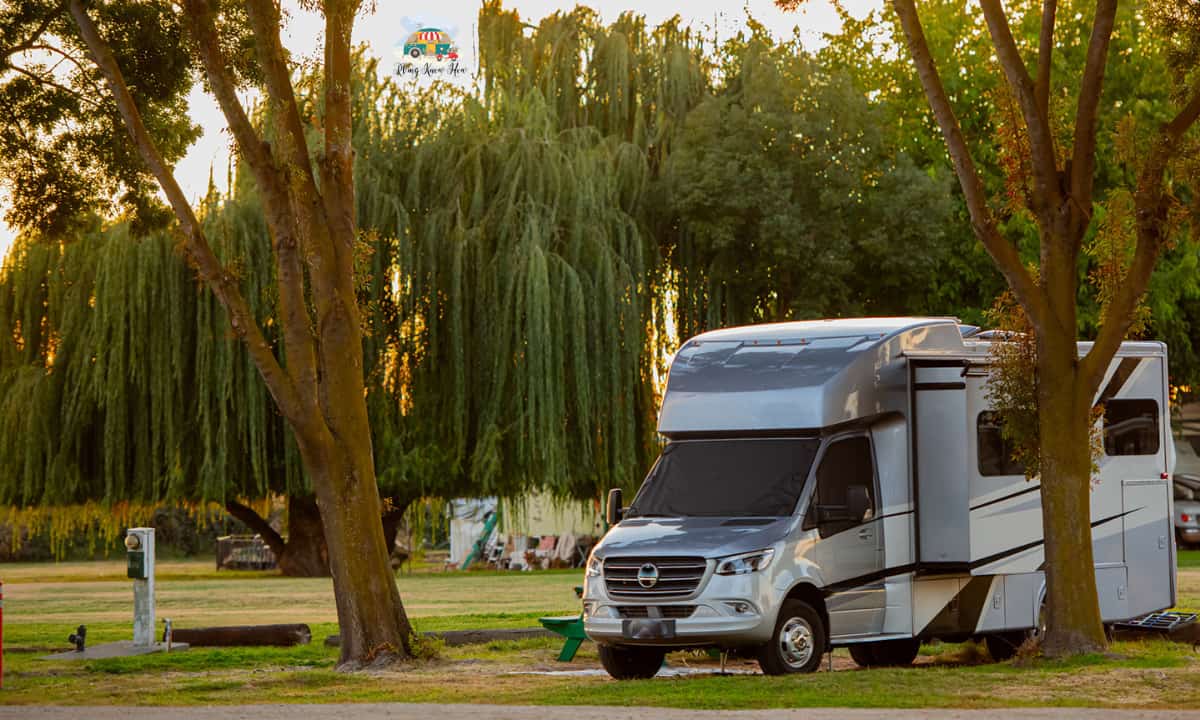If you have or are thinking about getting a fifth-wheel trailer, you might be wondering what’s the differences are between a gooseneck vs a 5th wheel hitch?
The differences between 5th wheel and gooseneck hitches are the coupling mechanism. The gooseneck trailer slides over a ball hitch that is installed in the cargo box of the pickup truck. Whereas fifth hitch has a heavy duty hinged metal plate that is designed to accept a kingpin from the fifth wheel trailer. It then clamps into place.
Still, there is a fair amount of gray area here, and adapters that might let you use one type of trailer with another type of hitch.
So, let’s dive into the nuts and bolts questions behind these two different ways to connect a fifth-wheel trailer to a pickup truck.
Which Is Better 5th Wheel Or Gooseneck?
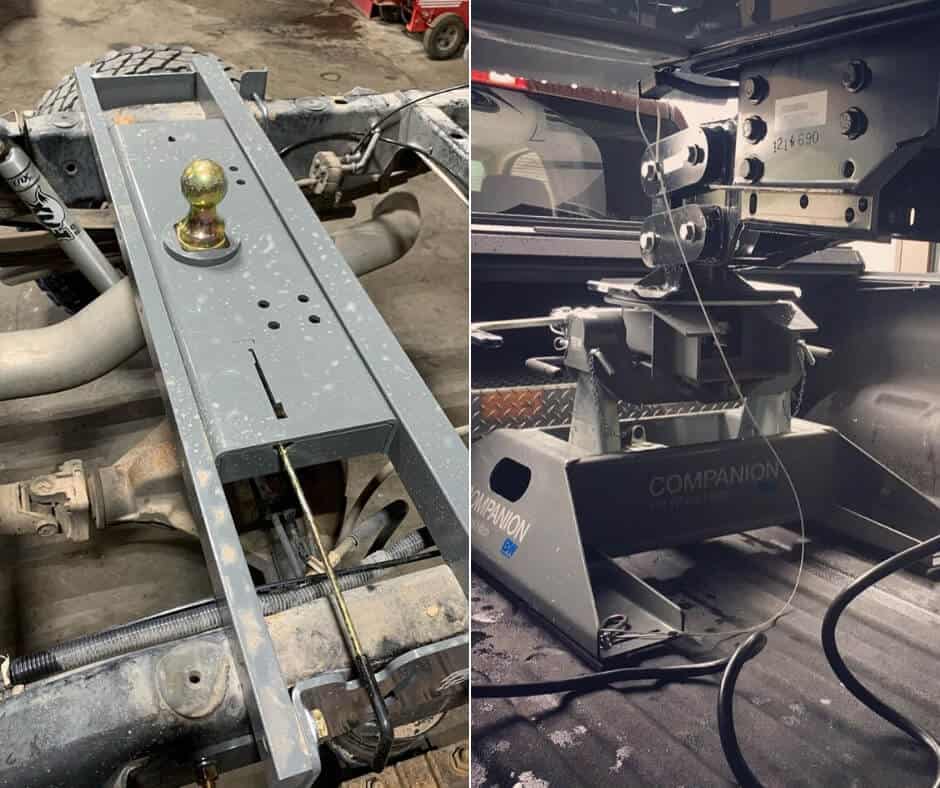
These are two different types of hitches meant to tow different types of fifth-wheel trailers.
you might be wondering which is better for your tow vehicle pickup truck, a gooseneck or a fifth wheel hitch?
The answer can vary a little bit depending on your truck, the size, and characteristics of your fifth-wheel trailer as well as any other fifth wheel trailers you might need to use for work.
Gooseneck trailers and hitches tend to be better for heavier fifth wheel trailers. This includes things like equipment trailers, horse trailers, commercial trailers, agricultural trailers and even some of the very large RV fifth wheel camper trailers. A fifth wheel hitch is typically meant to be paired with a fifth wheel trailer that has a king pin, they tend to be better for three-quarter and one-ton pickup trucks that need to tow light to mid-size RV fifth wheel campers.
What Is A Gooseneck Hitch?
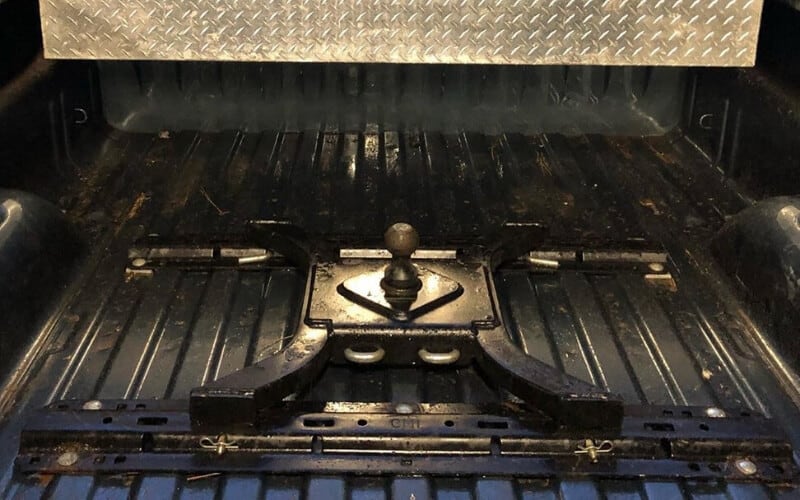
Essentially a gooseneck hitch uses a coupler and a ball to connect the fifth wheel trailer to the pickup truck rather than connecting a “Kingpin” to a receiver as you see in fifth wheel hitches.
You often see gooseneck hitches being used for horse trailers in long bed pickup trucks that need to deftly back the trailer into tight areas like fairgrounds parking lots and rugged primitive campsites.
What Are The Advantages Of A Gooseneck Hitch?
Arguably the largest advantage of a gooseneck hitch is it’s overall ability to tow a heavyweight fifth-wheel trailer.
This also translates into the gooseneck trailer being able to handle greater payload capacity and weight than a standard bumper-pull trailer.
Just bear in mind that your pickup truck tow vehicle still needs to have the payload capacity in the cargo box and suspension to handle all this weight.
Assuming your pickup truck does have the robust payload capacity to be up for the job, the gooseneck hitch gives you the ability to tow a commercial fifth wheel.
This makes them a preferred choice for professionals who need their pickup truck to work for a living towing equipment trailers from Monday through Friday, and then towing their fifth wheel RV camper on the weekends.
A gooseneck also has a tighter turning radius. Now, this might not show up much when you are towing an RV or equipment trailer forward.
Yet it really can shine if you need to carefully back the fifth wheel into a tight spot or around some challenging terrain.
What Are The Disadvantages Of A Gooseneck Hitch?
There are a few modest disadvantages to a gooseneck hitch. First of all, is the overall size of the trailer you tend to see with a gooseneck.
So, you will need a robust three-quarter-ton pickup truck or even a one-ton pickup truck to be able to safely tow a trailer with this kind of girth and gross vehicle weight rating.
Many gooseneck trailers are technically classified as commercial and you need a special driver’s license endorsement to tow it legally on state and federal highways.
What Is A 5th Wheel Hitch?
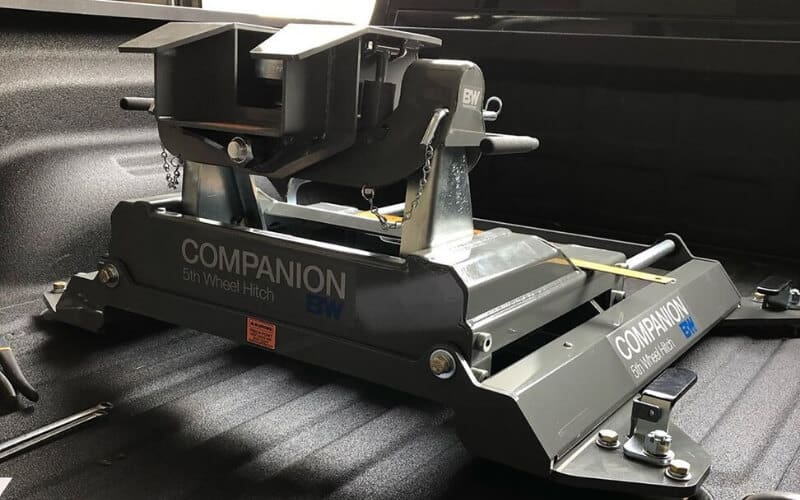
A fifth wheel hitch is installed directly into the structural frame of the pickup truck’s cargo box.
A robust kingpin on the nose cap of the fifth wheel trailer locks firmly into the receiver hitch of the pickup truck tow vehicle.
It’s then locked into place with a special internal clamping device. This is the type of hitch you see being used to tow a lot of recreational fifth-wheel trailers as well as lightweight cargo trailers such as hay wagons.
What Are The Advantages of Fifth Wheel Camper Hitches?
With a fifth-wheel hitch installed in the cargo box of your pickup truck, you’ll feel better weight displacement.
This is due to the secure connection between the fifth wheel trailer’s kingpin and the fifth wheel hitch that’s fastened firmly to the structural frame of the cargo box.
This often translates to a more comfortable towing experience for both the pickup truck as well as the fifth-wheel trailer.
Some argue that the fifth wheel camper tracks better behind the truck when pulling forward. Though others will hotly debate if this holds true for reversing a fifth-wheel trailer.
What Are The Disadvantages Of A Fifth Wheel Camper Hitch?
The most obvious disadvantage of a fifth-wheel trailer hitch is that it typically can’t tow as much it’s gooseneck counterpart.
This means you will likely be held to lightweight fifth-wheel campers and probably won’t have the ability to tow a commercial travel trailer.
A 5th Wheel Trailer vs A Gooseneck Trailer
When you weigh the advantages and disadvantages of both, you see that fifth-wheel trailer hitches tend to be geared more for light-duty applications. This includes towing most light to midsize the fifth wheel RV camper.
Gooseneck trailers and hitches are more heavyweight contenders. A gooseneck hitch is especially appealing if you are a professional with the proper driver’s license endorsement, and you need to tow a commercial equipment trailer.
They’re also increasingly popular in agricultural applications, including things like towing a horse trailer, which might be very lightweight when empty, but then suddenly takes on a significant tonnage when loaded with multiple horses at a time.
Can You Pull A 5th Wheel Trailer With A Gooseneck?
It is possible to pull a fifth-wheel trailer with a gooseneck hitch so long as the tow vehicle truck has the payload capacity.
However, you will need to install some type of adapter, which might also require other components.
Most of the time, it’s meant to be a short-term fix to handle a single trip or two in a season.
If you are planning to tow a gooseneck trailer frequently with an adapter on a fifth wheel hitch, the strain to both the tow vehicle and the trailer might start to cause stress and other structural issues.
What Is A Gooseneck Adapter?
A gooseneck adapter essentially attaches to the gooseneck ball or otherwise uses the ball hole of a gooseneck hitch to connect a gooseneck fifth-wheel trailer to a more traditional gooseneck hitch.
This lets you use both types of connections without having to make major modifications to the pickup truck.
It’s very handy for trucks that have to haul fifth wheel equipment trailers for work but have a different hitch on the RV fifth-wheel trailer at home.
How To Convert A 5th Wheel To A Gooseneck
Even if you have a traditional fifth-wheel trailer hitch installed into the structural frame of your pickup truck’s cargo box, you might still be able to use a gooseneck trailer.
Though to do so, you will need a fifth wheel to gooseneck adapter.
There are two different ways to do this. The first is to use an adapter that fits onto the gooseneck fifth-wheel trailer. The other is to use an above bed gooseneck hitch adapter.
Either method is considered to be safe. However, not all gooseneck adapters are meant to be a permanent solution to the problem.
Some can potentially limit the degree of movement in the contact point.
This makes for a little bit rougher of a ride and over time it can place an undue amount of stress on both the fifth-wheel trailer as well as the hitch.
So, you should think of these as short-term solutions to the problem.
Let’s say your truck has to work for a living pulling a fifth-wheel equipment trailer with a fifth-wheel hitch permanently installed in the box of the truck.
Yet you need to get your fifth wheel camper to the seasonal RV park, and it has a gooseneck ball.
In a situation like this, you could certainly get by with a gooseneck adapter.
However, if you are going to be taking multiple weekend trips with the gooseneck fifth wheel camper RV, you might want to seriously think about investing in having a gooseneck hitch permanently installed in your cargo box.
An Adapter For The Gooseneck Fifth Wheel Trailer
With this type of gooseneck adapter, you are essentially replacing the gooseneck fifth-wheel trailer’s inner tube or both the inner and outer tubes with a standard fifth-wheel hitch.
It helps if your fifth-wheel trailer’s gooseneck coupler height is adjustable. Then you can just loosen the set screws and remove the inner tube of the pins.
In some of these cases, you might also need to modify the fifth wheel trailer a little bit to make sure everything lines up with the existing holes.
Once you have everything dry fitted, you can slide in the adapter into place. This will replace the trailer’s inner tube with a kingpin. Then all you have to do is tighten the set screws or reinsert the pins.
An Adapter For A Fifth Wheel Hitch’s Rails in the Truck
If you don’t want to go through the process of adapting the trailer’s gooseneck, you can then choose an adapter for the fifth wheel hitch rails in the cargo box in your truck.
There’s a little more elbow grease involved in this option, but it might be the better route.
Especially if you are borrowing or renting the fifth wheel camper in question, or there is a fine print language that void’s the warranty by making modifications to the trailer.
With this option, you are essentially installing the adapter above-bed fifth-wheel rails just like a fifth-wheel hitch.
This calls for a pin-in installation which might have an offset short-bed trucks, which may also require more clearance.
Assuming you have industry-standard fifth-wheel rails, this type of adapter should work for you.
If you have a below the bed rail fifth wheel hitch, it can be dropped into place and locked into position.
Is It Possible To Bumper Pull A Gooseneck Trailer?
There are some adapters out there that will let you bumper pull a gooseneck trailer.
At first glance, this might sound like an attractive option for people with a full-size SUV or a half-ton pickup truck who wants to tow a fifth-wheel camper on a vacation.
Just bear in mind that with a fifth-wheel trailer the payload capacity of the vehicle and it’s suspension system supersedes the hitch weight.
So, look at the payload capacity stamped into the driver’s side door well of your SUV or half-ton pickup truck.
If the hitch weight of the fifth wheel camper in question is equal to or higher than the payload capacity of the proposed tow vehicle, it won’t work.
After that, you can factor in the gross vehicle weight rating (GVWR) of the fifth wheel camper and the towing capacity of the SUV or half-ton pickup truck.
It’s pretty rare for all these numbers to work according to plan. So, you rarely ever see these bumper-pull to gooseneck adapters being used.
Gooseneck vs 5th Wheel: Which Is Better?
At first glance, the difference between a gooseneck trailer and a traditional fifth wheel hitch and kingpin might seem drastic.
Gooseneck trailers tend to weight more and have a higher payload capacity. Some are even classified as commercial vehicles and require you to have a special driver’s license endorsement to tow them.
Yet there is a little gray area between the two that lets you adapt to tow one or the other or even both.
If you have a three-quarter-ton or one-ton pickup truck that needs to earn it’s kept by towing heavy-duty equipment trailers, or agricultural trailers, then you will probably want to lean heavily toward having a gooseneck hitch permanently installed into the cargo box of your pickup truck.
If your weekend RV needs a standard fifth wheel hitch, you can also install a temporary adapter.
If you are looking for the lightweight or midsize fifth wheel camper, but your truck truly doesn’t have to be repurposed as a workhorse on the weekdays, then you might want to lean toward a traditional fifth wheel hitch.
Even if you do need to occasionally tow a rental fifth wheel with a gooseneck, you can always employ an adapter.
Just make sure to double-check that the payload capacity of the truck is within a reasonable range of the tongue weight of the fifth wheel camper.

